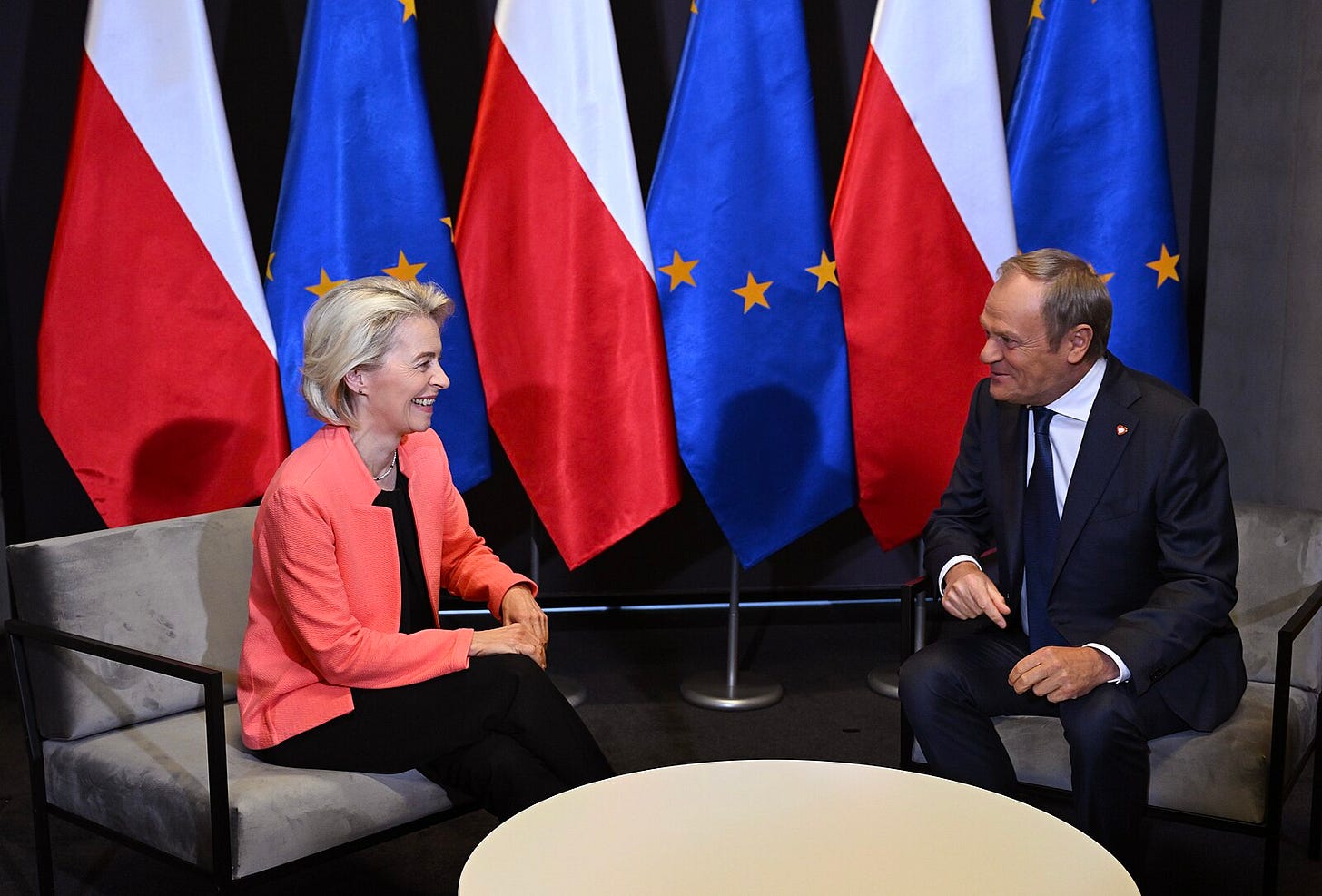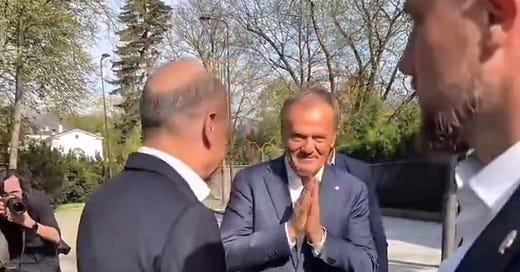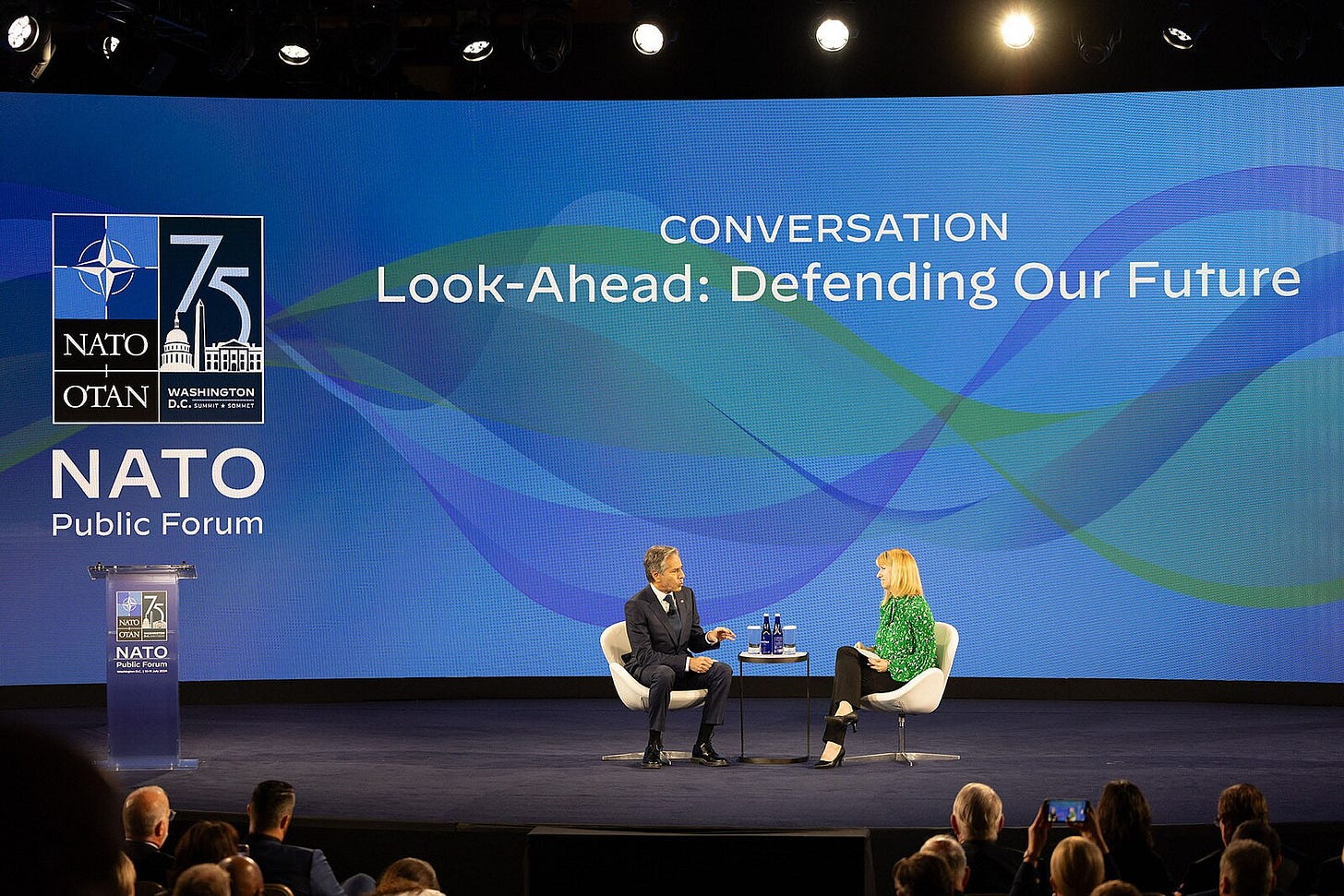Donald Tusk’s Cabinet: Germany’s Strategic Foothold in Polish Politics
Discover how Germany uses American think tanks to wield soft power in Poland, undermining both Polish sovereignty and U.S. strategic interests.
For a very long time here at RRWR we have claimed – as almost all conservatives in Poland have – that Donald Tusk and his political formation have been under, to put it mildly, a strong influence of German elites. At times, this influence appears as complete subservience and abandonment of Polish national interest in favor of German or European interests (which effectively translates to German interests, as the European Union is fundamentally a mechanism for German domination on the continent). Whenever Poland has an opportunity to strengthen its position against the European hegemon, the government of Donald Tusk immediately opposes it. Take, for instance, the Central Communication Port (CPK), a major infrastructure project designed to compete with German transport hubs. Upon Tusk regaining power, the project was swiftly labeled "megalomania" and frozen. Military strengthening and modernization plans that would potentially overshadow the Bundeswehr? These have been slowed, some halted entirely, and certain contracts—especially with American partners—now face cancellation or a forced shift towards "European" suppliers. Even the Three Seas Initiative, a promising regional cooperation platform recently successful in Warsaw and a realistic counterbalance to the decaying old Europe, has been openly sabotaged and smeared in the media by Tusk's administration, as exemplified by Foreign Minister Radosław Sikorski’s recent speech.
How did Germany, historically Poland’s oppressor intent not just on defeating Poland as an adversary but on the extermination of its culture and people, gain such influence? Among numerous explanations, one fact stands out: since the early 1990s, Germany has poured substantial amounts of money into various organizations and political circles in Poland. KLD, Donald Tusk’s former party, openly received funds (they were handed over to Polish colleagues in shopping bags) directly from Helmut Kohl’s associates, as described by its former General Secretary Paweł Piskorski. All of Tusk's subsequent political projects also received financial support from Germany. Direct funding from the German federal budget goes to social organizations that have a destabilizing effect on Poland, such as RAŚ (Movement of Silesian Autonomy) and various Kashubian organizations. Recently, the National Security Institute Foundation (Fundacja Instytut Bezpieczeństwa Narodowego, IBN) revealed that Germany is even leveraging American-based organizations to bolster its "soft power."
The report by the National Security Institute explicitly details how numerous high-ranking members of Donald Tusk’s government have been historically connected with the German Marshall Fund (GMF). While GMF presents itself as a U.S.-European organization founded in 1972 ostensibly to foster transatlantic relations, it primarily advances German strategic interests and promotes German soft power.
A particularly alarming example of this influence came in 2021 when Heather Conley, President of GMF and former Deputy Assistant Secretary of State in the Bush administration, openly lobbied before the U.S. Helsinki Commission for imposing economic sanctions against Poland and reconsidering U.S. military deployments due to alleged democratic backsliding—accusations fabricated and exaggerated by liberal-leftist media with no credible evidence. Ironically, today’s liberal-leftist government of Tusk engages in genuinely authoritarian methods against political opponents, underscoring the hypocrisy of earlier criticisms.
The direct connections between members of the Tusk administration and GMF are deeply troubling. Michał Baranowski, Undersecretary of State in the Ministry of Development and Technology, has been closely affiliated with GMF since 2005, even establishing its Warsaw office and directing its operations in Central and Eastern Europe. Zuzanna Rudzińska-Bluszcz, Undersecretary in the Ministry of Justice, is an alumna of GMF’s Marshall Memorial Fellowship. Maciej Duszczyk, Deputy Minister of Internal Affairs, actively participates in GMF’s Transatlantic Forum on Migration, promoting liberal migration policies. Other officials linked to GMF include Monika Sikora (Deputy Minister of Funds and Regional Policy), Krzysztof Bolesta (Deputy Minister of Climate and Environment), Monika Dziadkowiec (Director General at the Ministry of Climate), and Magdalena Sobkowiak-Czarnecka (Deputy Minister for European Affairs).

According to Stanisław Żaryn and Marcin Lidka from the National Security Institute, such widespread connections significantly compromise Poland’s governmental autonomy and credibility. GMF’s activities, largely financed by the German government, systematically shape political perceptions and actions detrimental to Polish sovereignty and national interest.
Furthermore, GMF-linked personnel have infiltrated leading academic and policy institutions, notably the Institute for Western Affairs, a primary research center on Polish-German relations. Recent appointments include individuals such as Michał Baranowski and Agnieszka Łada-Konefał, the latter also serving in a senior role at the German Institute for Polish Affairs, further blurring lines between Polish national interests and German influence.

The implications for Poland—and indeed, for U.S. strategic interests—are profound. The Trump administration should rigorously audit organizations like GMF, often penetrated by factions openly hostile to American interests. Equally critical is promoting genuinely American-led soft power initiatives to counteract foreign influence effectively.
Moreover, Germany should no longer enjoy the protective umbrella provided by the U.S. This strategic protection must instead shift to reliable allies genuinely supportive of American interests, such as Poland and Israel. President Trump is well aware of Germany’s economic competition with the U.S. and its undermining behaviors. Redirecting American support and investment toward trusted allies is both logical and urgently necessary.








If not secrete, where did we found our graceful Donald Tusk?
It seems that for some reason Doggy-Dog bows to his masters, how about his little tail activity?
How to figure out which master he is trying to please more and why so?
I think you can be “lefty” that is fine, but some common thinking and moderation should be always present. You can be lefty, but be diligent when having to deal with difficult national considerations.
Perhaps Donald Tusk, still lives through the Czterej Pancerni and Tusk, meaning Szarik. But our Szarik then didn’t speak German, as Tusk is modeled on the Czeka moderation.